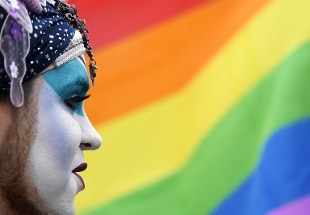Mattarella: To reject all forms of intolerance and discrimination
Quirinale, Mattarella reduces the pension allowance
Homophobia, his driver's license was suspended because he was gay.
Cassation: "Yes to maxi compensation"
The homophobia and irony of American football champions
Elton John becomes a matryoshka against homophobia
Share
17 May 2016
Why is it celebrated on 17 May?
May 17, 1990 is a historic date: 26 years ago, the World Health Organization (WHO) deleted homosexuality from the list of mental illnesses, defining it for the first time "a natural variant of human behavior". Today this date is commemorated by celebrating the "world day against homophobia". However, there was a long way to go to that goal.
Gay communities began to demand civil rights in Western countries only in the early 1970s. At the same time, the scientific world also began to revise the theories regarding homosexuality: in 1974 it was canceled from the Diagnostic and Statistical Manual of Mental Disorders (DSM) published by the American Psychiatric Association (APA). There are many intermediate stages, starting from the first version of the 1952 manual where homosexuality was still a psychopathological condition among the “Sociopathic Personality Disorders”; in 1968 it was considered a sexual deviation, such as pedophilia, classified among the "Non-Psychotic Mental Disorders". And again in 1974 the scientific texts spoke of "egodistonic homosexuality",that is, that condition in which a homosexual person does not accept his sexual orientation and does not live it with serenity. This theory will be superseded in 1987 but will only become official with the decision taken by the WHO in 1990.
Still considered a crime in 86 countries
There are currently 86 countries in the world that condemn same-sex relationships with sentences that include imprisonment, flogging and the death penalty.
Death penalty in seven countries
There are seven countries in which homosexuality, especially male homosexuality, is punished with the death penalty.
In some of them, a distinction is made on the basis of gender, prescribing more severe penalties for intercourse between men. In
Iran
, for example, the death penalty is provided for sodomy, while the law prescribes 100 lashes for lesbianism. Similarly in
Mauritania
where male homosexuality is punished by stoning, while female homosexuality can cost up to two years in prison and a fine of 60,000 ouguiya, equal to approximately 210 dollars.
In
Qatar
and
the United Arab Emirates
sodomy can be punished with the death penalty.
In
Saudi Arabia
, where the sentences derive from the interpretation of the Shari'a, married men and non-Muslims are subjected to stoning; for unmarried men, on the other hand, there are 100 lashes and one year's exile from the community. Similarly the penal code of
Yemen
sentenced married men to stoning, while unmarried men were punished with 100 lashes and one year in prison. For homosexual women, however, the law establishes a prison term of up to 3 years and 100 lashes.
There
is a progressive penalty system in
Sudan
. The first and second convictions for homosexuality can cost the accused whiplash and 5 years in prison; however, in the event of a third conviction, the judicial system provides for life imprisonment or the death penalty.
Stoning is also foreseen
in the 12 states of
the Nigerian Federation
, where the Shari'a is in force.
Severe penalties even in the United States
Although in 2015 the Supreme Court recognized the right to marry for same-sex couples, a decision preceded by a 2003 ruling that declared the anti-sodomy laws unconstitutional and archaic, there are 12
US
states
where these rules still remain in force: in case sodomy are provided up to 15 years in prison in
Michigan
, down to a maximum of 10 in
Utah, Kansas, Oklahoma, Texas, Louisiana, Mississippi, Alabama, Florida, North Carolina, South Carolina and Idaho.
Data from lgbt-rights-hrw.silk.co

